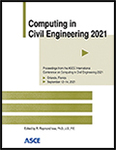Laser Intensity-Assisted Construction Material Classification in Point Cloud Data Using Deep Learning
Publication: Computing in Civil Engineering 2021
ABSTRACT
The state-of-the-art in construction material classification has used various machine learning approaches using 2D color image data sets. However, construction materials are often discolored due to other foreign substances and lighting conditions, making it challenging to classify construction materials only with color information. To address this problem, this study presents a new material classification method employing laser intensity values as another parameter. A hierarchical 3D deep learning approach is adopted for the material classification in laser scanned-3D point cloud data. The deep learning model was trained with a self-developed point cloud data set, which includes laser intensity value as well as 3D coordinates and color codes. This study conducted a case study at an actual building construction site to validate the proposed classification method. As a result, when additionally using intensity values as an input feature for network training, the accuracy was from 5% to 14% higher than when the intensity was not used. Therefore, we identify that laser intensity can improve material classification results.
Get full access to this article
View all available purchase options and get full access to this chapter.
REFERENCES
Bell, S., P. Upchurch, N. Snavely, and K. Bala. 2014. “Material Recognition in the Wild with the Materials in Context Database.” In,.
Boulch, A., B. Le Saux, and N. Audebert. 2017. “Unstructured point cloud semantic labeling using deep segmentation networks.” In Proceedings of the Workshop on 3D Object Retrieval, 17–24. Lyon, France: Eurographics Association.
Dimitrov, A., and M. Golparvar-Fard. 2014. 'Vision-based material recognition for automated monitoring of construction progress and generating building information modeling from unordered site image collections', Advanced Engineering Informatics, 28: 37–49.
Guldur, B., and J. F. Hajjar. 2014. “Damage Detection on Structures Using Texture Mapped Laser Point Clouds.” In Structures Congress 2014, 324–34.
Hu, D., L. Bo, and X. Ren. 2011. “Toward Robust Material Recognition for Everyday Objects.” In BMVC, 6. Citeseer.
Park, J., J. Chen, and Y. K. Cho. 2020. “Point Cloud Information Modeling (PCIM): An Innovative Framework for As-Is Information Modeling of Construction Sites.” In Construction Research Congress 2020: Computer Applications, 1319–26. American Society of Civil Engineers Reston, VA.
Qi, C. R., H. Su, K. Mo, and L. J. Guibas. 2016. “PointNet: Deep Learning on Point Sets for 3D Classification and Segmentation.” In,.
Qi, C. R., L. Yi, H. Su, and L. J. Guibas. 2017. “PointNet++: Deep Hierarchical Feature Learning on Point Sets in a Metric Space.” In,.
Rashidi, A., M. H. Sigari, M. Maghiar, and D. Citrin. 2016. 'An analogy between various machine-learning techniques for detecting construction materials in digital images', KSCE Journal of Civil Engineering, 20: 1178–88.
Sharan, L., C. Liu, R. Rosenholtz, and E. H. Adelson. 2013. 'Recognizing Materials using Perceptually Inspired Features', International journal of computer vision, 103: 348–71.
Song, J.-H., S.-H. Han, K. Y. Yu, and Y.-I. Kim. 2002. 'Assessing the possibility of land-cover classification using lidar intensity data', International archives of photogrammetry remote sensing and spatial information sciences, 34: 259–62.
Tao, S., Q. Guo, Y. Su, S. Xu, Y. Li, and F. Wu. 2015. 'A Geometric Method for Wood-Leaf Separation Using Terrestrial and Simulated Lidar Data', Photogrammetric Engineering & Remote Sensing, 81: 767–76.
Tatoglu, A., and K. Pochiraju. 2012. “Point cloud segmentation with LIDAR reflection intensity behavior.” In 2012 IEEE International Conference on Robotics and Automation, 786–90. IEEE.
Tchapmi, L. P., C. B. Choy, I. Armeni, J. Gwak, and S. Savarese. 2017. “SEGCloud: Semantic Segmentation of 3D Point Clouds.” In,.
Information & Authors
Information
Published In
History
Published online: May 24, 2022
Authors
Metrics & Citations
Metrics
Citations
Download citation
If you have the appropriate software installed, you can download article citation data to the citation manager of your choice. Simply select your manager software from the list below and click Download.
